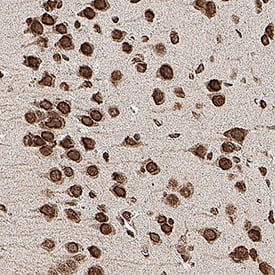Mouse/Rat ADNP Antibody
Mouse/Rat ADNP Antibody Summary
Leu941-Ala1102
Accession # Q9H2P0
*Small pack size (-SP) is supplied either lyophilized or as a 0.2 µm filtered solution in PBS.
Applications
Please Note: Optimal dilutions should be determined by each laboratory for each application. General Protocols are available in the Technical Information section on our website.
Scientific Data
 View Larger
View Larger
Detection of Mouse/Rat ADNP by Western Blot. Western blot shows lysates of embryonic rat cortical neuron/ glial cells. PVDF membrane was probed with 1 µg/mL of Goat Anti-Mouse/Rat ADNP Antigen Affinity-purified Polyclonal Antibody (Catalog # AF5919) followed by HRP-conjugated Anti-Goat IgG Secondary Antibody (Catalog # HAF019). A specific band was detected for ADNP at approximately 150 kDa (as indicated). This experiment was conducted under reducing conditions and using Immunoblot Buffer Group 1.
 View Larger
View Larger
ADNP in RAW 264.7 Mouse Cell Line. ADNP was detected in immersion fixed RAW 264.7 mouse monocyte/macrophage cell line using Goat Anti-Mouse/Rat ADNP Antigen Affinity-purified Polyclonal Antibody (Catalog # AF5919) at 10 µg/mL for 3 hours at room temperature. Cells were stained using the NorthernLights™ 557-conjugated Anti-Goat IgG Secondary Antibody (red, upper panel; Catalog # NL001) and counterstained with DAPI (blue, lower panel). Specific staining was localized to nuclei. View our protocol for Fluorescent ICC Staining of Cells on Coverslips.
 View Larger
View Larger
ADNP in Mouse Brain. ADNP was detected in perfusion fixed frozen sections of mouse brain (cerebellum) using Goat Anti-Mouse/Rat ADNP Antigen Affinity-purified Polyclonal Antibody (Catalog # AF5919) at 1.7 µg/mL overnight at 4 °C. Tissue was stained using the NorthernLights™ 557-conjugated Anti-Goat IgG Secondary Antibody (red; Catalog # NL001). Specific staining was localized to Purkinje cells and neurons in molecular cell layer. View our protocol for Fluorescent IHC Staining of Frozen Tissue Sections.
 View Larger
View Larger
Detection of ADNP in Mouse Brain. ADNP was detected in immersion fixed paraffin-embedded sections of mouse brain using Goat Anti-Mouse/Rat ADNP Antigen Affinity-purified Polyclonal Antibody (Catalog # AF5919) at 1.7 µg/ml for 1 hour at room temperature followed by incubation with the Anti-Goat IgG VisUCyte™ HRP Polymer Antibody (Catalog # VC004) or the HRP-conjugated Anti-Goat IgG Secondary Antibody (Catalog # HAF109). Before incubation with the primary antibody, tissue was subjected to heat-induced epitope retrieval using VisUCyte Antigen Retrieval Reagent-Basic (Catalog # VCTS021). Tissue was stained using DAB (brown) and counterstained with hematoxylin (blue). Specific staining was localized to the nucleus. View our protocol for IHC Staining with VisUCyte HRP Polymer Detection Reagents.
Reconstitution Calculator
Preparation and Storage
- 12 months from date of receipt, -20 to -70 °C as supplied.
- 1 month, 2 to 8 °C under sterile conditions after reconstitution.
- 6 months, -20 to -70 °C under sterile conditions after reconstitution.
Background: ADNP
ADNP (Activity-dependent neuroprotective protein) is an ADNF-related factor found in astrocytes and microvascular endothelial cells. Although its predicted MW is 124 kDa, it runs anomalously at 148‑150 kDa in SDS-PAGE. ADNP is inducible by VIP in astrocytes, and serves as a neuroprotector, both outside and inside the cell. Extracellularly, ADNP may protect synapse activity; intracellularly, ADNP interacts with tubulin, promoting microtubule assembly, and within the nucleus, it contributes to the SWI/SNF chromatin remodeling complex. Mouse ADNP is 1108 amino acids (aa) in length. It contains a neuroprotective peptide/NAP (aa 354‑361) embedded between nine C2H2-type Zn finger domains (aa 76‑685), a DNA-binding homeobox region (aa 752‑813) and a Leu-rich NLS that overlaps a protein internalization sequence (aa 787‑812). There are alternative start sites at Met229 and Met281. Over aa 947‑1108, mouse ADNP shares 98% and 93% aa identity with rat and human ADNP, respectively.
Product Datasheets
Citations for Mouse/Rat ADNP Antibody
R&D Systems personnel manually curate a database that contains references using R&D Systems products. The data collected includes not only links to publications in PubMed, but also provides information about sample types, species, and experimental conditions.
3
Citations: Showing 1 - 3
Filter your results:
Filter by:
-
ADNP Controls Gene Expression Through Local Chromatin Architecture by Association With BRG1 and CHD4
Authors: XiaoYun Sun, WenJun Yu, Li Li, YuHua Sun
Frontiers in Cell and Developmental Biology
Species: Human, Mouse
Sample Types: Cell Lysates, Chromatin
Applications: Co-Immunoprecipitation, Western Blot, Chromatin Immunoprecipitation (ChIP) -
ADNP promotes neural differentiation by modulating Wnt/beta-catenin signaling
Authors: X Sun, X Peng, Y Cao, Y Zhou, Y Sun
Nat Commun, 2020-06-12;11(1):2984.
Species: Mouse
Sample Types: Cell Lysates
Applications: Co-IP, Western Blot -
Novel evolutionary-conserved role for the activity-dependent neuroprotective protein (ADNP) family that is important for erythropoiesis.
Authors: Dresner E, Malishkevich A, Arviv C, Leibman Barak S, Alon S, Ofir R, Gothilf Y, Gozes I
J Biol Chem, 2012-10-15;287(48):40173-85.
Species: Mouse
Sample Types: Cell Lysates
Applications: ChIP
FAQs
No product specific FAQs exist for this product, however you may
View all Antibody FAQsReviews for Mouse/Rat ADNP Antibody
There are currently no reviews for this product. Be the first to review Mouse/Rat ADNP Antibody and earn rewards!
Have you used Mouse/Rat ADNP Antibody?
Submit a review and receive an Amazon gift card.
$25/€18/£15/$25CAN/¥75 Yuan/¥2500 Yen for a review with an image
$10/€7/£6/$10 CAD/¥70 Yuan/¥1110 Yen for a review without an image
